The Cultural Space of Superior Justice Tribunal receives cocktail of opening of exhibition Quatressência organized by curator Celina Kaufman.
The Cultural Space STJ (SUPERIOR TRIBUNAL DE JUSTIÇA) received in the last night , 15, the cocktail of opening of Collective Exhibition Quatressência, of fine arts Luiz Costa, Sonnia Guerra, Pompeii Crust and Tony Lima. The event disposed of presence of four plastic artists and his guests. The display intends to emphasize this diversity and individuality, providing to a visitor a reflection on the paper of the art in the evolution of individual.
 O curador carioca radicado na Finlândia, Edson Cardoso, lançou nesta semana, no 14 a 26 de fevereiro de 2017, a Exposição "BELA Bienal, Lançamento da terceira edição - Sustentabilidade" – em cartaz no espaço da ONU / Nova Iorque. Representando seu empreendimento, A AVA Galleria, o Instituto Cultural Brasil Finlândia, através da PLS receberam a partir do dia 14 de fevereiro o Pré-lançamento da BELA Bienal, são 54 artistas entre brasileiros e finlandeses que compõe a mostra com o tema "Sustentabilidade". NO evento realizado nas Nações Unidas, será também comemorado os de 100 anos de amizade entre o Brasil e a Finlândia. A mostra tem o objetivo de mostrar obras, que tenham relação com esse tema tão importante para a sobrevivência da humanidade. Na ocasião, fora lançado também a revista AVA Magazine, edição especial da mostra de Pré-lançamento da BELA Bienal, a primeira edição da BELA Bienal, aconteceu em Porto, Portugal no Palácio de Cristal, num espaço pertencente a prefeitura local em 2012/13. A segunda edição aconteceu no Rio de Janeiro no Museu Historio Nacional e na Galeria Scenarium de dezembro de 2014 a marco de 2015. Os artistas brasileiros e Finlandeses que estão representados nessa mostra são: Ana Martins, Alexandre Iodice, Arão Pinto, Avilmar Maia, Bia Monteiro, Carlos Gomes, Davi Faustino, Erisson Thompson Jr, Gustavo Kuklinski, J. Baião, Juliana Pavanelli, Matheus Almeida, Neumi Crepel, Paulo Roberto Gobo, Siomara Almeida, Tereza Vianna, AnneMilana, Aulikki Nukala, Hannu Tenhunen, Jan Ekström, Janne Teräväinen, Jari Järnström, Jouko Väärälä, Jukka Tuominen, Laura Pohjonen, Lauri Pietarinen, Leila Sarola, Markku Walldén, Paula Suominen, Päivyt Niemeläinen, Sanna-Mari Rautavirta, Seija Grönqvist, Seppo Kari, Serge Gauya, Sihvonen Marita, Sirkka Laakkonen, Susanna Teräväinen, Tapio Hirvonen, Tapio Hyvönen. Depois da ONU a exposição da BELA Bienal, seguirá suas apresentações no espaço cultural do Shopping Pátio Brasil, em Brasília, onde terá o lançamento oficial da terceira edição. Depois a Bienal, encerrerá suas apresentações com uma exposição na Finlândia, tendo também artistas da Europa e da América Latina. Serviço Exposição BELA Bienal - Sustentabilidade .
O curador carioca radicado na Finlândia, Edson Cardoso, lançou nesta semana, no 14 a 26 de fevereiro de 2017, a Exposição "BELA Bienal, Lançamento da terceira edição - Sustentabilidade" – em cartaz no espaço da ONU / Nova Iorque. Representando seu empreendimento, A AVA Galleria, o Instituto Cultural Brasil Finlândia, através da PLS receberam a partir do dia 14 de fevereiro o Pré-lançamento da BELA Bienal, são 54 artistas entre brasileiros e finlandeses que compõe a mostra com o tema "Sustentabilidade". NO evento realizado nas Nações Unidas, será também comemorado os de 100 anos de amizade entre o Brasil e a Finlândia. A mostra tem o objetivo de mostrar obras, que tenham relação com esse tema tão importante para a sobrevivência da humanidade. Na ocasião, fora lançado também a revista AVA Magazine, edição especial da mostra de Pré-lançamento da BELA Bienal, a primeira edição da BELA Bienal, aconteceu em Porto, Portugal no Palácio de Cristal, num espaço pertencente a prefeitura local em 2012/13. A segunda edição aconteceu no Rio de Janeiro no Museu Historio Nacional e na Galeria Scenarium de dezembro de 2014 a marco de 2015. Os artistas brasileiros e Finlandeses que estão representados nessa mostra são: Ana Martins, Alexandre Iodice, Arão Pinto, Avilmar Maia, Bia Monteiro, Carlos Gomes, Davi Faustino, Erisson Thompson Jr, Gustavo Kuklinski, J. Baião, Juliana Pavanelli, Matheus Almeida, Neumi Crepel, Paulo Roberto Gobo, Siomara Almeida, Tereza Vianna, AnneMilana, Aulikki Nukala, Hannu Tenhunen, Jan Ekström, Janne Teräväinen, Jari Järnström, Jouko Väärälä, Jukka Tuominen, Laura Pohjonen, Lauri Pietarinen, Leila Sarola, Markku Walldén, Paula Suominen, Päivyt Niemeläinen, Sanna-Mari Rautavirta, Seija Grönqvist, Seppo Kari, Serge Gauya, Sihvonen Marita, Sirkka Laakkonen, Susanna Teräväinen, Tapio Hirvonen, Tapio Hyvönen. Depois da ONU a exposição da BELA Bienal, seguirá suas apresentações no espaço cultural do Shopping Pátio Brasil, em Brasília, onde terá o lançamento oficial da terceira edição. Depois a Bienal, encerrerá suas apresentações com uma exposição na Finlândia, tendo também artistas da Europa e da América Latina. Serviço Exposição BELA Bienal - Sustentabilidade .
AVA Galleria from Finland and the Cultural Institute ICNBF (Instituto Cultural Nórdico Brasil Finlândia)in partnership with the Portuguese Language Society have organized the exhibition
100-year-old FINLAND and SUSTAINABILITY
Date: February 14 – 24, 2017
Place: United Nations Headquarters
During 2017 Pre-BELA (Biennial of European and Latin American contemporary Art) will celebrate the Centennial
of Finland ́s Declaration of Independence and Friendship with Brazil through very important mainstream theme
of Sustainability .
Artists:
Alexandre Iodice
Ana Martins
AnneMilana
Arão Pinto
Aulikki Nukala
Avilmar Maia
Bia Monteiro
Davi Faustino
Erisson Thompson Jr
Gustavo Kuklinski
Hannu Tenhunen
J. Baião
Jan Ekström
Janne Teräväinen
Jari Järnström
Jouko Väärälä
Jukka Tuominen
Laura Pohjonen
Lauri Pietarinen
Leila Sarola
Licia
Markku Walldén
Matheus Almeida
Neumi Crepel
Paula Suominen
Paulo Roberto Gobo
Päivyt Niemeläinen
Sanna-Mari Rautavirta
Seija Grönqvist
Seppo Kari
Serge Gauya
Sihvonen Marita
Siomara Almeida
Sirkka Laakkonen
Susanna Teräväinen
Tapio Hirvonen
Tapio Hyvönen
Curator: Edson Cardoso
Priorities of the Brazilian Foreign Policy in 2017
March 1 @ 6:10 pm - 8:00 pm
Event Navigation
Monday, February 20
NEW ERA FOR GUYANA: OIL, BORDERS AND RELATIONS WITH THE USA
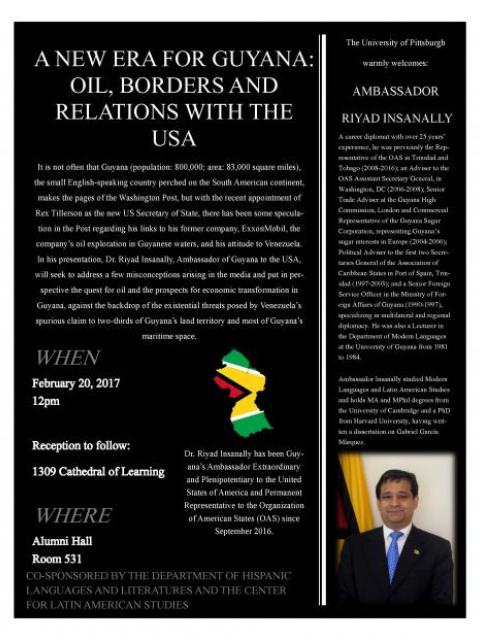
Time:
12:00 pm
Presenter:
AMBASSADOR RIYAD INSANALLY
Location:
531 Alumni Hall and Reception in 1309 Cathedral of Learning
Sponsored by:
Center for Latin American Studies along with Department of Hispanic Languages and Literatures
Contact:
Lucy DiStazio
Contact Phone:
8-7391
Contact Email:
lud3@pitt.edu
It is not often that Guyana (population: 800,000; area: 83,000 square miles), the small English-speaking country perched on the South American continent, makes the pages of the Washington Post, but with the recent appointment of Rex Tillerson as the new US Secretary of State, there has been some specula-tion in the Post regarding his links to his former company, ExxonMobil, the company’s oil exploration in Guyanese waters, and his attitude to Venezuela.
In his presentation, Dr. Riyad Insanally, Ambassador of Guyana to the USA, will seek to address a few misconceptions arising in the media and put in per-spective the quest for oil and the prospects for economic transformation in Guyana, against the backdrop of the existential threats posed by Venezuela’s spurious claim to two-thirds of Guyana’s land territory and most of Guyana’s maritime space.
Wednesday, February 22
Dinámicas de la narración factual y ficcional en las letras coloniales: Naufragios [1542] de Alvar Núñez Cabeza de Vaca e Infortunios de Alonso Ramírez [1690] de Carlos de Sigüenza y Góngora
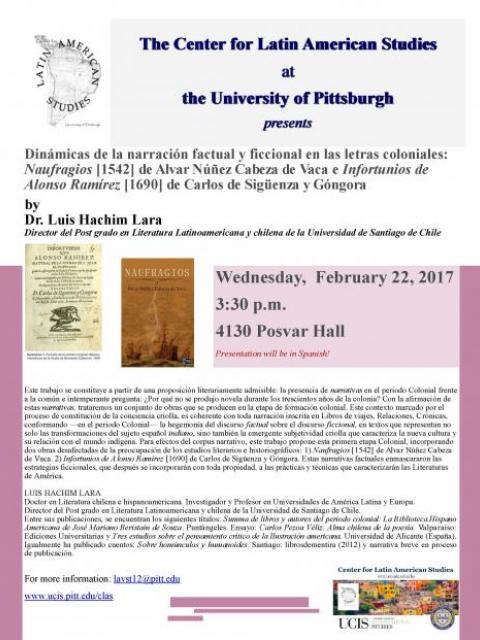
Time:
3:30 pm
Presenter:
Dr. Luis Hachim Lara
Location:
4130 Posvar Hall
Sponsored by:
Center for Latin American Studies
Contact:
Luz Amanda Hank
Contact Phone:
8-7391
Contact Email:
lavst12@pitt.edu
Este trabajo se constituye a partir de una proposición literariamente admisible: la presencia de narrativas en el periodo Colonial frente a la común e intemperante pregunta: ¿Por qué no se produjo novela durante los trescientos años de la colonia? Con la afirmación de estas narrativas, trataremos un conjunto de obras que se producen en la etapa de formación colonial. Este contexto marcado por el proceso de constitución de la conciencia criolla, es coherente con toda narración inscrita en Libros de viajes, Relaciones, Crónicas, conformando —en el periodo Colonial— la hegemonía del discurso factual sobre el discurso ficcional, en textos que representan no solo las transformaciones del sujeto español indiano, sino también la emergente subjetividad criolla que caracteriza la nueva cultura y su relación con el mundo indígena. Para efectos del corpus narrativo, este trabajo propone esta primera etapa Colonial, incorporando dos obras desafectadas de la preocupación de los estudios literarios e historiográficos: 1) Naufragios [1542] de Alvar Núñez Cabeza de Vaca. 2) Infortunios de Alonso Ramírez [1690] de Carlos de Sigüenza y Góngora. Estas narrativas factuales enmascararon las estrategias ficcionales, que después se incorporarán con toda propiedad, a las prácticas y técnicas que caracterizarán las Literaturas de América.
LUIS HACHIM LARA
Doctor en Literatura chilena e hispanoamericana. Investigador y Profesor en Universidades de América Latina y Europa.
Director del Post grado en Literatura Latinoamericana y chilena de la Universidad de Santiago de Chile.
Entre sus publicaciones, se encuentran los siguientes títulos: Summa de libros y autores del periodo colonial: La Biblioteca Hispano Americana de José Mariano Beristaín de Souza. Puntángeles. Ensayo: Carlos Pezoa Véliz: Alma chilena de la poesía. Valparaíso: Ediciones Universitarias y Tres estudios sobre el pensamiento crítico de la Ilustración americana. Universidad de Alicante (España). Igualmente ha publicado cuentos: Sobre homúnculos y humanoides. Santiago: librosdementira (2012) y narrativa breve en proceso de publicación.
Doctor en Literatura chilena e hispanoamericana. Investigador y Profesor en Universidades de América Latina y Europa.
Director del Post grado en Literatura Latinoamericana y chilena de la Universidad de Santiago de Chile.
Entre sus publicaciones, se encuentran los siguientes títulos: Summa de libros y autores del periodo colonial: La Biblioteca Hispano Americana de José Mariano Beristaín de Souza. Puntángeles. Ensayo: Carlos Pezoa Véliz: Alma chilena de la poesía. Valparaíso: Ediciones Universitarias y Tres estudios sobre el pensamiento crítico de la Ilustración americana. Universidad de Alicante (España). Igualmente ha publicado cuentos: Sobre homúnculos y humanoides. Santiago: librosdementira (2012) y narrativa breve en proceso de publicación.
Tuesday, February 28
El Negro Raúl: Lives and Afterlives of an Afro-Argentine Celebrity (1886-Present)
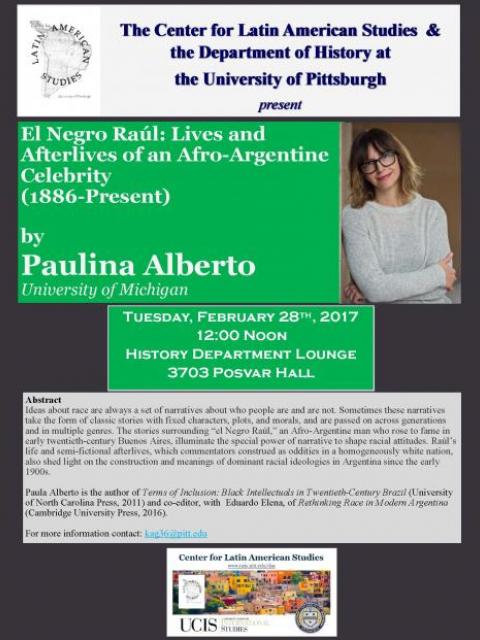
Time:
12:00 pm
Presenter:
Paulina Alberto
Location:
History Department Lounge--3703 Posvar Hall
Sponsored by:
Center for Latin American Studies along with Department of History
Contact:
kag36@pitt.edu
Contact Email:
kag36@pitt.edu
Abstract
Ideas about race are always a set of narratives about who people are and are not. Sometimes these narratives take the form of classic stories with fixed characters, plots, and morals, and are passed on across generations and in multiple genres. The stories surrounding “el Negro Raúl,” an Afro-Argentine man who rose to fame in early twentieth-century Buenos Aires, illuminate the special power of narrative to shape racial attitudes. Raúl’s life and semi-fictional afterlives, which commentators construed as oddities in a homogeneously white nation, also shed light on the construction and meanings of dominant racial ideologies in Argentina since the early 1900s.
Ideas about race are always a set of narratives about who people are and are not. Sometimes these narratives take the form of classic stories with fixed characters, plots, and morals, and are passed on across generations and in multiple genres. The stories surrounding “el Negro Raúl,” an Afro-Argentine man who rose to fame in early twentieth-century Buenos Aires, illuminate the special power of narrative to shape racial attitudes. Raúl’s life and semi-fictional afterlives, which commentators construed as oddities in a homogeneously white nation, also shed light on the construction and meanings of dominant racial ideologies in Argentina since the early 1900s.
Paula Alberto is the author of Terms of Inclusion: Black Intellectuals in Twentieth-Century Brazil (University of North Carolina Press, 2011) and co-editor, with Eduardo Elena, of Rethinking Race in Modern Argentina (Cambridge University Press, 2016).
For more information contact: kag36@pitt.edu
Latin American in Motion:
Pitt Latin American Films
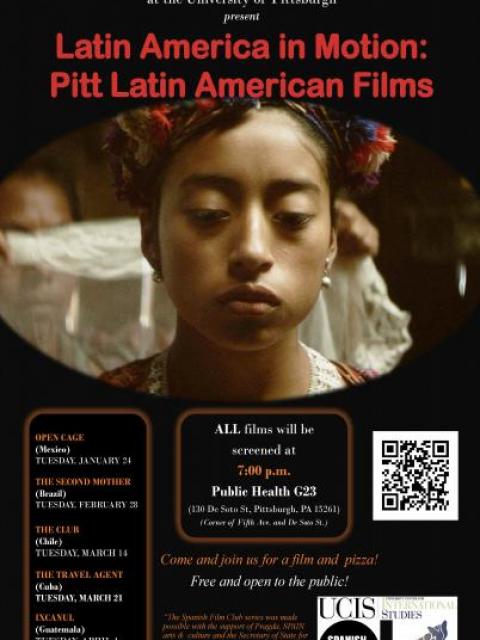
Time:
7:00 pm
Location:
Public Health G23
Sponsored by:
Center for Latin American Studies along with Deaprtment of Hispanic Languages & Literatures, the Year of DIVERSITY at the University of Pittsburgh and Spanish Film Club
Cost:
Free
Contact:
Luz Amanda Hank
Contact Phone:
412-648-7391
Contact Email:
lavst12@pitt.edu
The Center for Latin American Studies and the Department of Hispanic Languages & Literatures at the University of Pittsburgh
present
Latin America in Motion: Pitt Latin American Films
present
Latin America in Motion: Pitt Latin American Films
All Films will be screened at 7:00 p.m.
Public Health G23
130 De Soto St, Pittsburgh, PA 15261
(corner of 5th ave, and De Soto St.)
Public Health G23
130 De Soto St, Pittsburgh, PA 15261
(corner of 5th ave, and De Soto St.)
Come and join us for a film and pizza!
Free and open to the public!
Films:
OPEN CAGE
(Mexico)
TUESDAY, JANUARY 24
(Mexico)
TUESDAY, JANUARY 24
THE SECOND MOTHER
(Brazil)
TUESDAY, FEBRUARY 28
(Brazil)
TUESDAY, FEBRUARY 28
THE CLUB
(Chile)
TUESDAY, MARCH 14
(Chile)
TUESDAY, MARCH 14
THE TRAVEL AGENT
(Cuba)
TUESDAY, MARCH 21
(Cuba)
TUESDAY, MARCH 21
IXCANUL
(Guatemala)
TUESDAY, APRIL 4
(Guatemala)
TUESDAY, APRIL 4
All films are subtitled.
Tuesday, March 14
Latin American in Motion:
Pitt Latin American Films
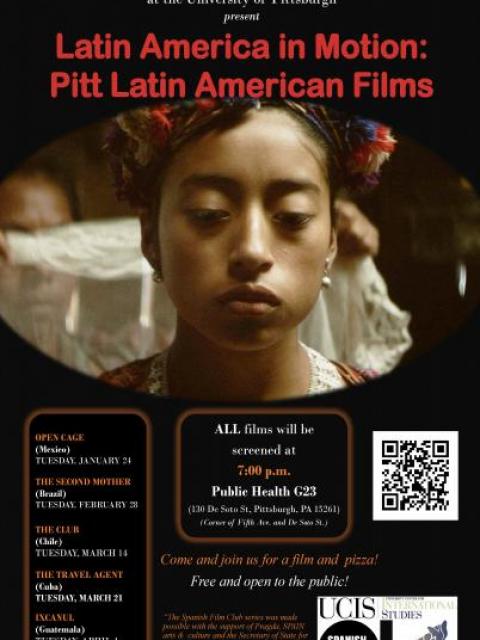
Time:
7:00 pm
Location:
Public Health G23
Sponsored by:
Center for Latin American Studies along with Deaprtment of Hispanic Languages & Literatures, and the Year of Diversity at the University of Pittsburgh and Spanish Film Club by Pragda
Cost:
Free
Contact:
Luz Amanda Hank
Contact Phone:
412-648-7391
Contact Email:
lavst12@pitt.edu
The Center for Latin American Studies and the Department of Hispanic Languages & Literatures at the University of Pittsburgh
present
Latin America in Motion: Pitt Latin American Films
present
Latin America in Motion: Pitt Latin American Films
All Films will be screened at 7:00 p.m.
Public Health G23
130 De Soto St, Pittsburgh, PA 15261
(corner of 5th ave, and De Soto St.)
Public Health G23
130 De Soto St, Pittsburgh, PA 15261
(corner of 5th ave, and De Soto St.)
Come and join us for a film and pizza!
Free and open to the public!
Films:
OPEN CAGE
(Mexico)
TUESDAY, JANUARY 24
(Mexico)
TUESDAY, JANUARY 24
THE SECOND MOTHER
(Brazil)
TUESDAY, FEBRUARY 28
(Brazil)
TUESDAY, FEBRUARY 28
THE CLUB
(Chile)
TUESDAY, MARCH 14
(Chile)
TUESDAY, MARCH 14
THE TRAVEL AGENT
(Cuba)
TUESDAY, MARCH 21
(Cuba)
TUESDAY, MARCH 21
IXCANUL
(Guatemala)
TUESDAY, APRIL 4
(Guatemala)
TUESDAY, APRIL 4
All films are subtitled.
Wednesday, March 15
Encounters with the Amazon's Sacred Vine
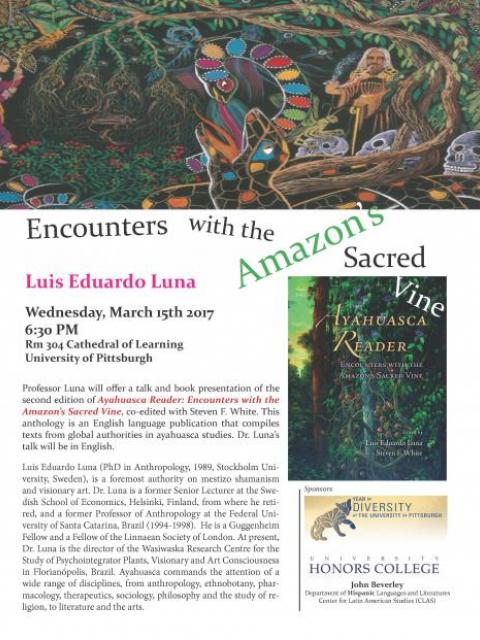
Time:
6:30 pm
Presenter:
Luis Eduardo Luna
Location:
304 Cathedral of Learning
Sponsored by:
Center for Latin American Studies along with Department of Hispanic Language and Literature and John Beverley and the Year of Diversity at the university of Pittsburgh
Contact:
Lucy DiStazio
Contact Email:
lud3@pitt.edu
Professor Luna will offer a talk and book presentation of the second edition of Ayahuasca Reader: Encounters with the Amazon’s Sacred Vine, co-edited with Steven F. White. This anthology is an English language publication that compiles texts from global authorities in ayahuasca studies. Dr. Luna’s talk will be in English.
Luis Eduardo Luna (PhD in Anthropology, 1989, Stockholm University, Sweden), is a foremost authority on mestizo shamanism and visionary art. Dr. Luna is a former Senior Lecturer at the Swedish School of Economics, Helsinki, Finland, from where he retired, and a former Professor of Anthropology at the Federal University of Santa Catarina, Brazil (1994-1998). He is a Guggenheim Fellow and a Fellow of the Linnaean Society of London. At present, Dr. Luna is the director of the Wasiwaska Research Centre for the Study of Psychointegrator Plants, Visionary and Art Consciousness in Florianópolis, Brazil. Ayahuasca commands the attention of a wide range of disciplines, from anthropology, ethnobotany, pharmacology, therapeutics, sociology, philosophy and the study of religion, to literature and the arts.
Sponsors:
Luis Eduardo Luna (PhD in Anthropology, 1989, Stockholm University, Sweden), is a foremost authority on mestizo shamanism and visionary art. Dr. Luna is a former Senior Lecturer at the Swedish School of Economics, Helsinki, Finland, from where he retired, and a former Professor of Anthropology at the Federal University of Santa Catarina, Brazil (1994-1998). He is a Guggenheim Fellow and a Fellow of the Linnaean Society of London. At present, Dr. Luna is the director of the Wasiwaska Research Centre for the Study of Psychointegrator Plants, Visionary and Art Consciousness in Florianópolis, Brazil. Ayahuasca commands the attention of a wide range of disciplines, from anthropology, ethnobotany, pharmacology, therapeutics, sociology, philosophy and the study of religion, to literature and the arts.
Sponsors:
John Beverley
Department of Hispanic Languages and Literatures
Center for Latin American Studies (CLAS)
Department of Hispanic Languages and Literatures
Center for Latin American Studies (CLAS)
Tuesday, March 21
Latin American in Motion:
Pitt Latin American Films
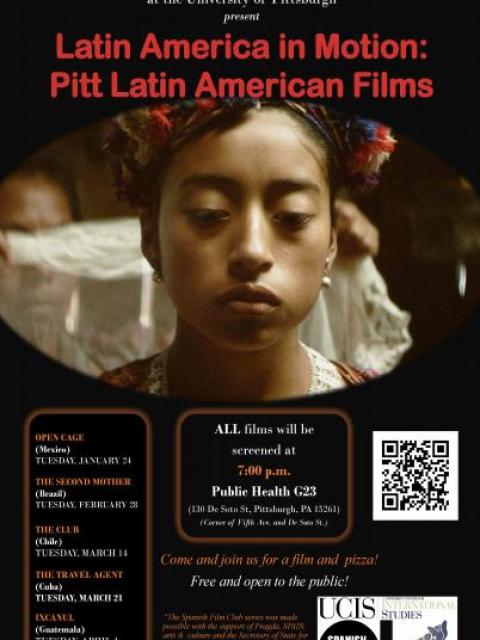
Time:
7:00 pm
Location:
Public Health G23
Sponsored by:
Center for Latin American Studies along with Department of Hispanic Languages and Literature, and the Year of Diversity at the University of Pittsburgh and Spanish Film Club by Pragda
Cost:
Free
Contact:
Luz Amanda Hank
Contact Phone:
412-648-7391
Contact Email:
lavst12@pitt.edu
The Center for Latin American Studies and the Department of Hispanic Languages & Literatures at the University of Pittsburgh
present
Latin America in Motion: Pitt Latin American Films
present
Latin America in Motion: Pitt Latin American Films
All Films will be screened at 7:00 p.m.
Public Health G23
130 De Soto St, Pittsburgh, PA 15261
(corner of 5th ave, and De Soto St.)
Public Health G23
130 De Soto St, Pittsburgh, PA 15261
(corner of 5th ave, and De Soto St.)
Come and join us for a film and pizza!
Free and open to the public!
Films:
OPEN CAGE
(Mexico)
TUESDAY, JANUARY 24
(Mexico)
TUESDAY, JANUARY 24
THE SECOND MOTHER
(Brazil)
TUESDAY, FEBRUARY 28
(Brazil)
TUESDAY, FEBRUARY 28
THE CLUB
(Chile)
TUESDAY, MARCH 14
(Chile)
TUESDAY, MARCH 14
THE TRAVEL AGENT
(Cuba)
TUESDAY, MARCH 21
(Cuba)
TUESDAY, MARCH 21
IXCANUL
(Guatemala)
TUESDAY, APRIL 4
(Guatemala)
TUESDAY, APRIL 4
All films are subtitled.
Tuesday, April 4
Latin American in Motion:
Pitt Latin American Films
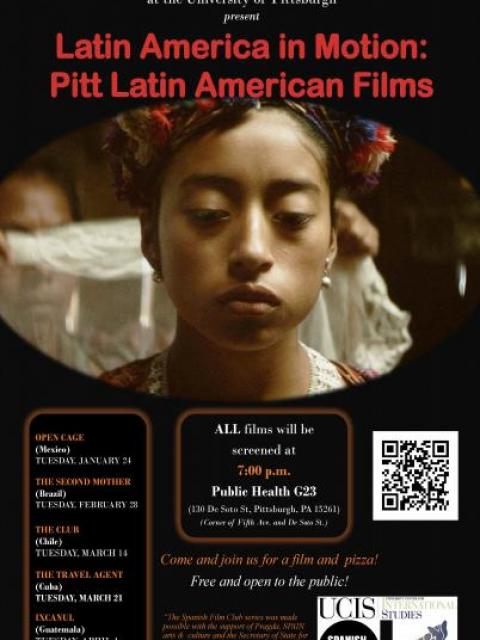
Time:
7:00 pm
Location:
Public Health G23
Sponsored by:
Center for Latin American Studies along with the Department of Hispanic Languages and Literatures, and the Year of Diversity at the University of Pittsburgh and Spanish Film Club by Pragda
Cost:
Free
Contact:
Luz Amanda Hank
Contact Phone:
412-648-7391
Contact Email:
lavst12@pitt.edu
The Center for Latin American Studies and the Department of Hispanic Languages & Literatures at the University of Pittsburgh
present
Latin America in Motion: Pitt Latin American Films
present
Latin America in Motion: Pitt Latin American Films
All Films will be screened at 7:00 p.m.
Public Health G23
130 De Soto St, Pittsburgh, PA 15261
(corner of 5th ave, and De Soto St.)
Public Health G23
130 De Soto St, Pittsburgh, PA 15261
(corner of 5th ave, and De Soto St.)
Come and join us for a film and pizza!
Free and open to the public!
Films:
OPEN CAGE
(Mexico)
TUESDAY, JANUARY 24
(Mexico)
TUESDAY, JANUARY 24
THE SECOND MOTHER
(Brazil)
TUESDAY, FEBRUARY 28
(Brazil)
TUESDAY, FEBRUARY 28
THE CLUB
(Chile)
TUESDAY, MARCH 14
(Chile)
TUESDAY, MARCH 14
THE TRAVEL AGENT
(Cuba)
TUESDAY, MARCH 21
(Cuba)
TUESDAY, MARCH 21
IXCANUL
(Guatemala)
TUESDAY, APRIL 4
(Guatemala)
TUESDAY, APRIL 4
All films are subtitled.
Friday, April 28
UCIS Graduation Ceremony
Time:
3:00 pm
Location:
Ballroom A, University Club
Sponsored by:
African Studies Program, Asian Studies Center, Center for Latin American Studies, Center for Russian and East European Studies, European Studies Center and Global Studies Center








